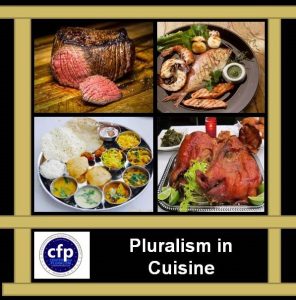Pluralism in Cuisine
Four individual have been enjoying working together for several months, and one day they decided to go for lunch. They sat around the table and ordered the food and start telling the jokes while waiting for the food.
Ten minutes later the food arrives and is placed on the table – 4 individuals had ordered 4 dishes – Pork, Beef, Fish, and Vegetarian. The food was a surprise to all, they realized that even though they belonged to 4 different faiths (Christian, Jewish, Muslim, and Hindu) they did not expect the food would create conflict.

The Hindu lady screamed at the Jewish man, “Jacob (dramatization to make a point), I thought you knew I am a Hindu and Cow is sacred to me, how can you be so insensitive? How can you eat that beef, don’t you care how I feel?” She was hurt and threw a fit! Jacob, on the other hand, was yelling at the Christian lady, “Jonie, I did not think you would eat that pork in front of me knowing that I don’t eat Pork, you have just pissed me off.” All the four had nasty things to say, and their enthusiasm dwindled down, and quietly, they ate in tension and went back to the office without talking with each other.
Now, just remember Christmas, Diwali, Rosh Hashanah or Ramadan or any holiday wherein you exchange gifts. Do you remember the sister was so happy for her brother for getting his iPad, and he was so happy that his little sister got the latest i-phone?
Now, let’s take this attitude back to the dining table. Pluralism is simply an attitude of respecting the otherness of others.
The food arrives on the table; the Muslim guy looks at the Pork chops in Christian lady’s plate and says, Joni, you have been talking about those Pork Chops for a while, I hope you’d enjoy them. She says thank you. Aruna looks up at Jacob and says, I hope you enjoy the steak that you’ve been talking about. Their jokes continue – they respected the otherness of others. The Jewish man did not have to eat pork, nor Aruna had to eat beef – what you eat goes in your stomach, it shouldn’t be anyone’s worry.
Our religions, mothers, foods, drinks and our family members are dear to us and we have to learn to respect each other’s choices, as long as it does not hurt you, let the others enjoy what they enjoy.
If we can learn to respect the otherness of other and accept the God-given uniqueness of each one of us, then conflicts fade and solutions emerge. At the Center for pluralism, we are committed to building a cohesive America, where no one feels apprehension, tension or fear of the other.
Thank you
What do we do at the Center for Pluralism
https://centerforpluralism.com/what-do-we-do-at-center-for-pluralism
Mike Ghouse
Center for Pluralism
Washington, DC
(214) 325-1916
Mike@CenterforPluralism.com
www.CenterforPluralism.com
www.PluralismNews.com
www.InterfaithMarriages.org